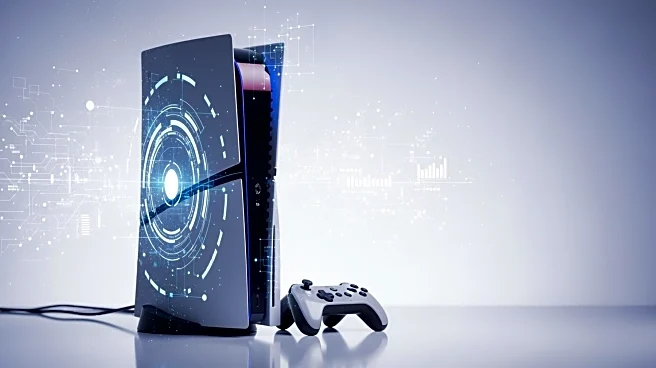What's Happening?
The PlayStation 5, a popular gaming console, is facing increased prices due to tariffs imposed by President Trump. These tariffs have led to a price hike for the PS5, which is expected to affect holiday shoppers looking to purchase the console. The PS5 is available
in three variants: Digital, Slim, and Pro, each offering different features and price points. The Digital version is priced at $500, the Slim at $550, and the Pro at $750. The tariffs have already caused a price increase in August, and further hikes may be anticipated, similar to those seen with Microsoft's Xbox Series consoles. The PS5 Slim is noted for its compact design, while the PS5 Pro offers enhanced graphics capabilities. Despite the price increases, the PS5 Slim is considered the best value among the options.
Why It's Important?
The price increase of the PS5 due to tariffs has significant implications for consumers and the gaming industry. Higher costs may deter potential buyers, impacting sales during the crucial holiday season. This situation highlights the broader economic effects of trade policies on consumer goods. The gaming industry, which relies heavily on hardware sales, could face challenges in maintaining growth if prices continue to rise. Consumers may need to reconsider their purchasing decisions, potentially opting for less expensive alternatives or delaying purchases. The situation underscores the interconnectedness of trade policies and consumer markets, with tariffs directly influencing retail pricing and consumer access to technology.
What's Next?
As the holiday season approaches, consumers and retailers are closely monitoring potential further price increases for gaming consoles. Sony may need to strategize on pricing and promotional offers to mitigate the impact of tariffs and maintain consumer interest. Retailers might offer bundled deals or discounts to attract buyers despite higher prices. Additionally, the gaming industry could advocate for policy changes to alleviate tariff impacts. Consumers are advised to make purchasing decisions promptly to avoid potential future price hikes. The situation may also prompt discussions on trade policy adjustments to support consumer access to technology products.
Beyond the Headlines
The tariff-induced price hikes on gaming consoles like the PS5 may lead to broader discussions on trade policy and its impact on consumer goods. This situation could spark debates on the balance between protecting domestic industries and ensuring affordable access to technology for consumers. The gaming industry might explore alternative manufacturing or sourcing strategies to mitigate tariff effects. Additionally, the price increases could influence consumer behavior, with potential shifts towards digital gaming platforms or alternative entertainment options. The long-term implications of trade policies on technology access and consumer choice remain a critical area for analysis.
















